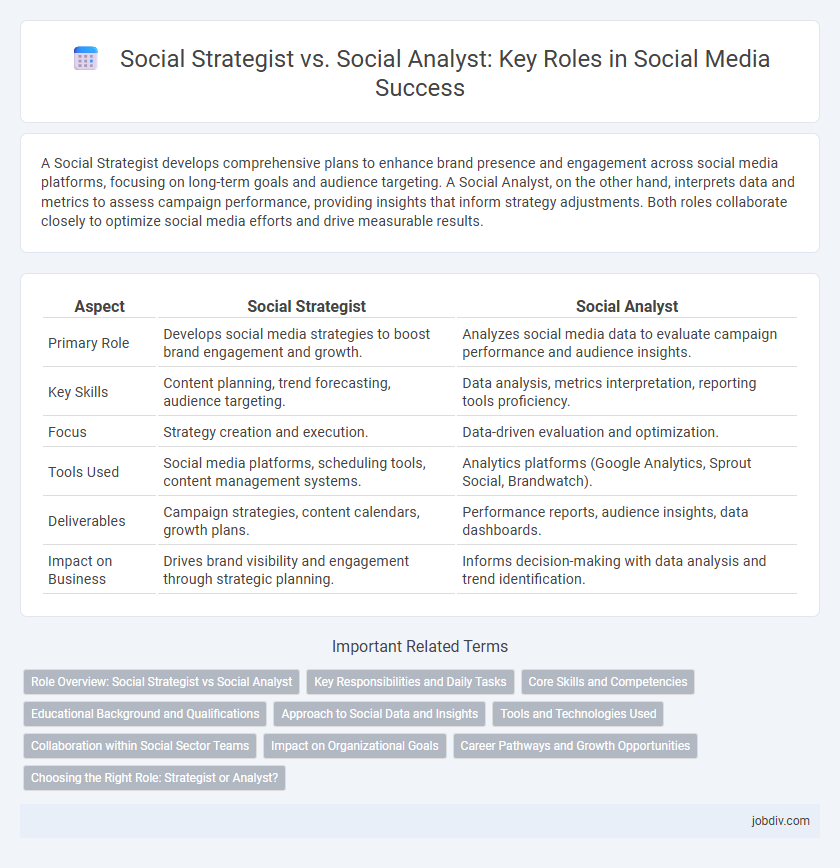A Social Strategist develops comprehensive plans to enhance brand presence and engagement across social media platforms, focusing on long-term goals and audience targeting. A Social Analyst, on the other hand, interprets data and metrics to assess campaign performance, providing insights that inform strategy adjustments. Both roles collaborate closely to optimize social media efforts and drive measurable results.
Table of Comparison
| Aspect | Social Strategist | Social Analyst |
|---|---|---|
| Primary Role | Develops social media strategies to boost brand engagement and growth. | Analyzes social media data to evaluate campaign performance and audience insights. |
| Key Skills | Content planning, trend forecasting, audience targeting. | Data analysis, metrics interpretation, reporting tools proficiency. |
| Focus | Strategy creation and execution. | Data-driven evaluation and optimization. |
| Tools Used | Social media platforms, scheduling tools, content management systems. | Analytics platforms (Google Analytics, Sprout Social, Brandwatch). |
| Deliverables | Campaign strategies, content calendars, growth plans. | Performance reports, audience insights, data dashboards. |
| Impact on Business | Drives brand visibility and engagement through strategic planning. | Informs decision-making with data analysis and trend identification. |
Role Overview: Social Strategist vs Social Analyst
A Social Strategist focuses on developing comprehensive social media plans to enhance brand presence and engagement, leveraging insights to align content with business goals. In contrast, a Social Analyst specializes in interpreting data to measure campaign performance, track audience behavior, and provide actionable recommendations based on metrics. Both roles are essential for a successful social media program, with strategists crafting the vision and analysts ensuring data-driven execution.
Key Responsibilities and Daily Tasks
A Social Strategist designs and implements comprehensive social media campaigns to align with brand goals, focusing on audience engagement and growth metrics. A Social Analyst collects and interprets data from social media platforms to evaluate campaign performance, track key performance indicators (KPIs), and provide actionable insights for optimization. While the strategist drives creative direction and content planning, the analyst ensures data-driven decision-making through continuous monitoring and reporting.
Core Skills and Competencies
A Social Strategist excels in creative content planning, audience targeting, and campaign development, leveraging insights to drive brand engagement. A Social Analyst specializes in data interpretation, metric tracking, and performance analysis, providing actionable reports to optimize social media tactics. Both roles require strong communication, critical thinking, and a deep understanding of social media platforms to enhance overall digital marketing effectiveness.
Educational Background and Qualifications
A Social Strategist typically holds a degree in marketing, communications, or business, with strong expertise in brand development and consumer behavior analysis. A Social Analyst often possesses educational qualifications in data science, statistics, or social research, emphasizing analytical skills and proficiency in data visualization tools. Both roles benefit from certifications in social media analytics and digital marketing platforms to enhance their strategic and analytical capabilities.
Approach to Social Data and Insights
A Social Strategist focuses on leveraging social data to create comprehensive plans that drive brand engagement and audience growth, using insights to forecast trends and tailor content strategies. In contrast, a Social Analyst dives deep into raw social metrics, applying quantitative techniques to measure campaign performance, identify patterns, and provide actionable reports. While Strategists interpret data to shape long-term objectives, Analysts emphasize precise data collection and analysis to inform real-time decision-making.
Tools and Technologies Used
Social strategists leverage tools like Hootsuite, Sprout Social, and Buffer to schedule content, manage campaigns, and track engagement metrics, enabling them to align social initiatives with broader business goals. Social analysts utilize platforms such as Google Analytics, Brandwatch, and Tableau to interpret data trends, monitor social sentiment, and generate detailed reports that inform strategic decisions. Both roles integrate AI-powered insights and CRM systems to enhance audience targeting and optimize social media performance.
Collaboration within Social Sector Teams
Social strategists and social analysts collaborate closely within social sector teams to enhance program impact by aligning data-driven insights with strategic objectives. Strategists leverage qualitative and quantitative analyses provided by analysts to devise targeted interventions that address community needs effectively. This partnership fosters informed decision-making and improves resource allocation, ultimately advancing social initiatives.
Impact on Organizational Goals
A Social Strategist drives organizational goals by developing comprehensive social media plans that align with brand objectives and target audience engagement, resulting in increased brand awareness and customer loyalty. In contrast, a Social Analyst impacts goals by interpreting social data and performance metrics to provide actionable insights that refine strategies and optimize campaign effectiveness. Both roles contribute to achieving broader business outcomes, with the strategist shaping direction and the analyst ensuring data-driven decision-making.
Career Pathways and Growth Opportunities
Social Strategists shape brand narratives and campaign directions, leveraging creative insights for audience engagement and long-term growth in digital marketing. Social Analysts specialize in data interpretation, tracking KPIs, and generating actionable insights to optimize social media performance and ROI. Career pathways often see Social Analysts advancing into data science or business intelligence roles, while Social Strategists move toward senior marketing leadership positions or brand consultancy.
Choosing the Right Role: Strategist or Analyst?
Choosing between a social strategist and a social analyst depends on your business goals and skill set. Social strategists excel at developing comprehensive campaign plans and aligning social media efforts with brand objectives, while social analysts focus on data interpretation, tracking key performance indicators (KPIs), and measuring audience engagement. For companies prioritizing big-picture growth and creative direction, a strategist is ideal; businesses requiring data-driven insights and performance optimization benefit more from an analyst.
Social Strategist vs Social Analyst Infographic

 jobdiv.com
jobdiv.com